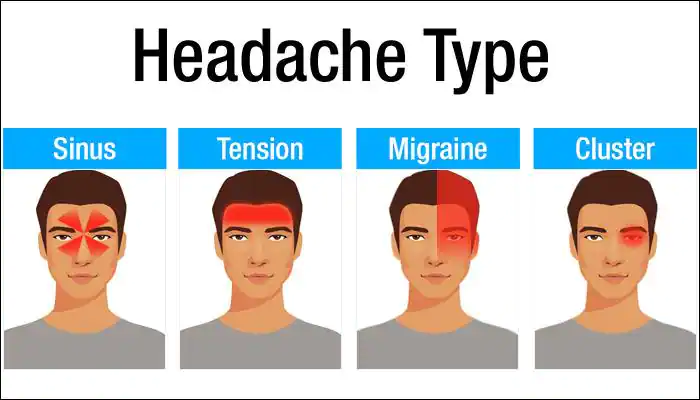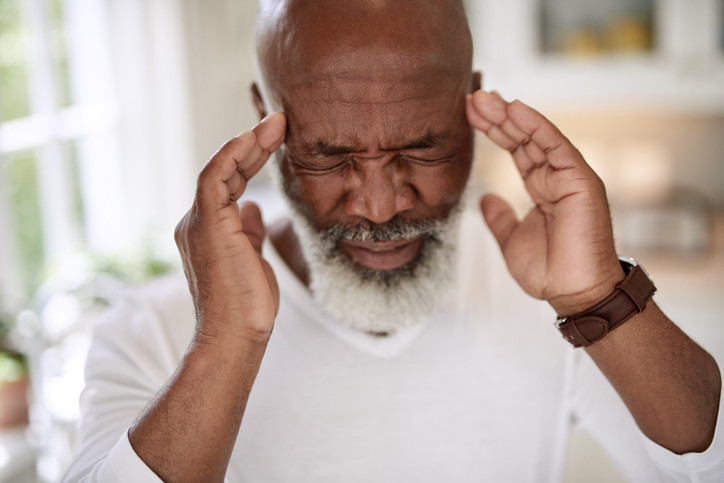There are millions of people suffering from headaches worldwide. They can have a wide range of causes and differ in intensity, duration, and location. Even though most headaches are not serious, they can still be extremely painful and incapacitating and, in some cases, may need to be treated medically. We’ll look at the most typical headache causes in this article.
Table of Contents

headaches with tension
The most prevalent type of headache is a tension headache, which is frequently brought on by stress, anxiety, and tension in the muscles of the neck and head. The forehead, temples, or back of the head may feel tight or pressured all the time during these headaches.
Migraines
A severe type of headache called a migraine can last for hours or even days. They frequently come with additional symptoms like sensitivity to light and sound, nausea, and vomiting. Although the precise cause of migraines is unknown, a combination of genetic, environmental, and lifestyle factors is thought to be responsible.
recurring headaches
Rare but extremely painful headaches, cluster headaches typically affect one side of the head. They frequently come with a runny noses, nasal congestion, and eye pain. Although the precise cause of cluster headaches is unknown, abnormalities in the hypothalamus, a region of the brain that controls the body’s natural rhythms, are thought to be a contributing factor.
nasal headaches
Inflammation or congestion in the sinuses is the cause of sinus headaches. They frequently affect the front of the head and are accompanied by other symptoms like facial pressure and nasal congestion. Allergies or infections are frequent causes of sinus headaches.
persistent headaches
Overuse of painkillers is a cause of rebound headaches. Frequent use of painkillers can actually make headache worse, creating a vicious cycle of overuse and worsening headaches.
Dehydration
Headaches can result from dehydration, especially in those who don’t drink enough water or participate in strenuous activities that make them perspire excessively. By drinking plenty of water and avoiding activities that cause excessive fluid loss, dehydration headaches can be avoided.
Withdrawal from caffeine
As a stimulant, caffeine can give people headaches if they consume too much of it or stop using it suddenly. It is possible to avoid caffeine withdrawal headaches by gradually cutting back on caffeine over a few days.

In conclusion, a variety of conditions, such as stress, tension, migraines, sinus congestion, overusing medications, dehydration, and caffeine withdrawal, can result in headaches. It’s crucial to see a doctor if you frequently or severely experience headaches in order to identify the underlying cause and create a customized treatment plan.
foods that have a reputation for causing headaches and how to stay away from them.
Finished Products
Artificial sweeteners, preservatives, and additives in processed foods are known to be in high concentrations and to cause headaches. These foods include frozen meals, canned soups, deli meats, and packaged snacks. These foods’ additives have the potential to exacerbate inflammation and upset the chemical balance in the brain, which can result in headaches.
Caffeine
Natural stimulants like caffeine can boost blood flow and narrow the blood vessels in the brain. While some people may find this to be advantageous, others may experience headaches as a result. Caffeine withdrawal symptoms, such as headaches, fatigue, and irritability, can result from excessive consumption.
Alcohol
Dehydration, a frequent headache causer and diuretic brought on by alcohol, can result in headaches. Additionally, it may cause the blood vessels in the brain to enlarge, which may result in a headache. Due to the tannins and histamines found in red wine, headaches are particularly known to be brought on by this beverage.
Aged Cheese
Tyramine is an amino acid found in aged cheeses like blue cheese, cheddar, and Parmesan that some people find to be a headache trigger. Tyramine, which is produced when the protein in cheese degrades over time, can narrow the blood vessels in the brain and result in headaches.
Synthetic sweeteners
Aspartame and saccharin, two artificial sweeteners, are frequently found in diet beverages and low-calorie foods. Some people have reported headaches from them, along with other side effects like nausea and dizziness.
tangerine fruits
Histamine, which is abundant in citrus fruits like oranges, lemons, and grapefruits, can give some people headaches. The body naturally produces the chemical histamine in response to allergens, which can widen the blood vessels in the brain and result in a headache.
How Can You Avoid Eating These Foods that cause headache?
It’s crucial to pay attention to what you eat and steer clear of foods that are known to cause headaches if you are prone to them. If you want to find out which foods are giving you headaches, you might want to keep a food journal.
Try making your meals from scratch with fresh ingredients to stay away from processed foods. To avoid additives and preservatives, you can also look for packaged foods that are marked as “all-natural” or “organic.”
If you do consume caffeine, try to keep it to no more than one or two cups per day of coffee or tea. To cut down on your caffeine intake, try switching to decaf or herbal tea.
Try to limit or completely avoid alcohol consumption to prevent headaches brought on by it. If you do decide to drink, make sure to drink plenty of water to stay hydrated.
Try to stay away from aged cheeses and other foods that contain tyramine if you are sensitive to it, such as soy sauce and fermented foods.
Try substituting natural sweeteners like honey, maple syrup, or stevia for artificial sweeteners, such as aspartame. Additionally, if you have a citrus fruit sensitivity, try to limit your consumption or opt for other fruits that are low in histamine.
In conclusion, a number of things, including specific foods, can result in headaches. You can lessen your symptoms and avoid headaches by keeping track of your diet and avoiding the foods that cause them.
How to stop having headaches
Both naturally and with the aid of medications, there are many ways to get rid of headaches. We’ll look at some of the best headache relief options in this article.
Unwind and take a nap
By giving yourself some time to relax and take a break, you can eliminate headaches quickly. Locate a peaceful, cozy spot to relax, then close your eyes. Breathe deeply and slowly, and give your mind some space. Yoga, deep breathing techniques, and meditation can all aid in relaxation.
Warm or Cool Compresses
Pain relief from headaches can be achieved by applying a hot or cold compress to the affected area. A warm compress can help loosen up tense muscles for tension headaches, while a cold compress can help dull migraine pain. Use a hot or cold pack, or wrap ice or a hot water bottle in a towel.
Hydration
It’s crucial to maintain proper hydration because dehydration frequently results in headaches. Avoid caffeine and alcohol, which can dehydrate you, and drink lots of water instead.
Over-the-Counter Drugs
Ibuprofen, aspirin, or acetaminophen are just a few examples of over-the-counter drugs that can ease headaches. These drugs function by lessening bodily pain and inflammation.
Aromatic oils
Natural headache relief has been achieved for centuries by using essential oils. Pain relief from headaches can be achieved particularly well with the help of peppermint, lavender, and eucalyptus oils. Add a few drops of the oil to a diffuser or a warm bath, or dab a small amount on your temples or the back of your neck.
Motion and Exercise
Movement and exercise are effective headache remedies because they increase blood flow, ease tension, and reduce stress. But it’s crucial to begin with low-impact activities like walking, swimming, or gentle yoga.
